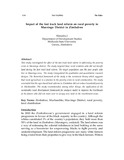Please use this identifier to cite or link to this item:
https://cris.library.msu.ac.zw//handle/11408/397Full metadata record
| DC Field | Value | Language |
|---|---|---|
| dc.contributor.author | Matunhu, Jephias | - |
| dc.date.accessioned | 2014-08-28T14:27:24Z | - |
| dc.date.available | 2014-08-28T14:27:24Z | - |
| dc.date.issued | 2011 | - |
| dc.identifier.issn | 1815-9036 | - |
| dc.identifier.uri | http://hdl.handle.net/11408/397 | - |
| dc.description.abstract | This study investigated the effect of the fast track land reform in addressing the poverty crisis in Masvingo district. The study targeted those rural residents who did not benefit land during the fast track land reform. The target population was the poor people who live in Masvingo area. The study triangulated the qualitative and quantitative research designs. The theoretical framework of the study is the revisionist theory which suggests that rural agriculture is a solution to the poverty crisis in rural communities. The study concluded that the agro-based land reforms in Zimbabwe did not reduce household poverty in Mushandike. The study recommended, among other things, the application of the sustainable rural development framework for analysis model to improve the livelihoods of the farmers who did not move over to occupy new land in the resettlement areas. | en_US |
| dc.language.iso | en | en_US |
| dc.publisher | Midlands State University | en_US |
| dc.relation.ispartofseries | Vol. 5;No. 1 | - |
| dc.subject | Mushandike | en_US |
| dc.subject | Masvingo District | en_US |
| dc.subject | Rural poverty | en_US |
| dc.title | Impact of the fast track land reform on rural poverty in Masvingo District in Zimbabwe | en_US |
| item.fulltext | With Fulltext | - |
| item.languageiso639-1 | en | - |
| item.grantfulltext | open | - |
| Appears in Collections: | Research Papers | |
Files in This Item:
| File | Description | Size | Format | |
|---|---|---|---|---|
| Matunhu.pdf | 158.98 kB | Adobe PDF |  View/Open |
Page view(s)
140
checked on Feb 11, 2026
Download(s)
62
checked on Feb 11, 2026
Google ScholarTM
Check
Items in MSUIR are protected by copyright, with all rights reserved, unless otherwise indicated.



